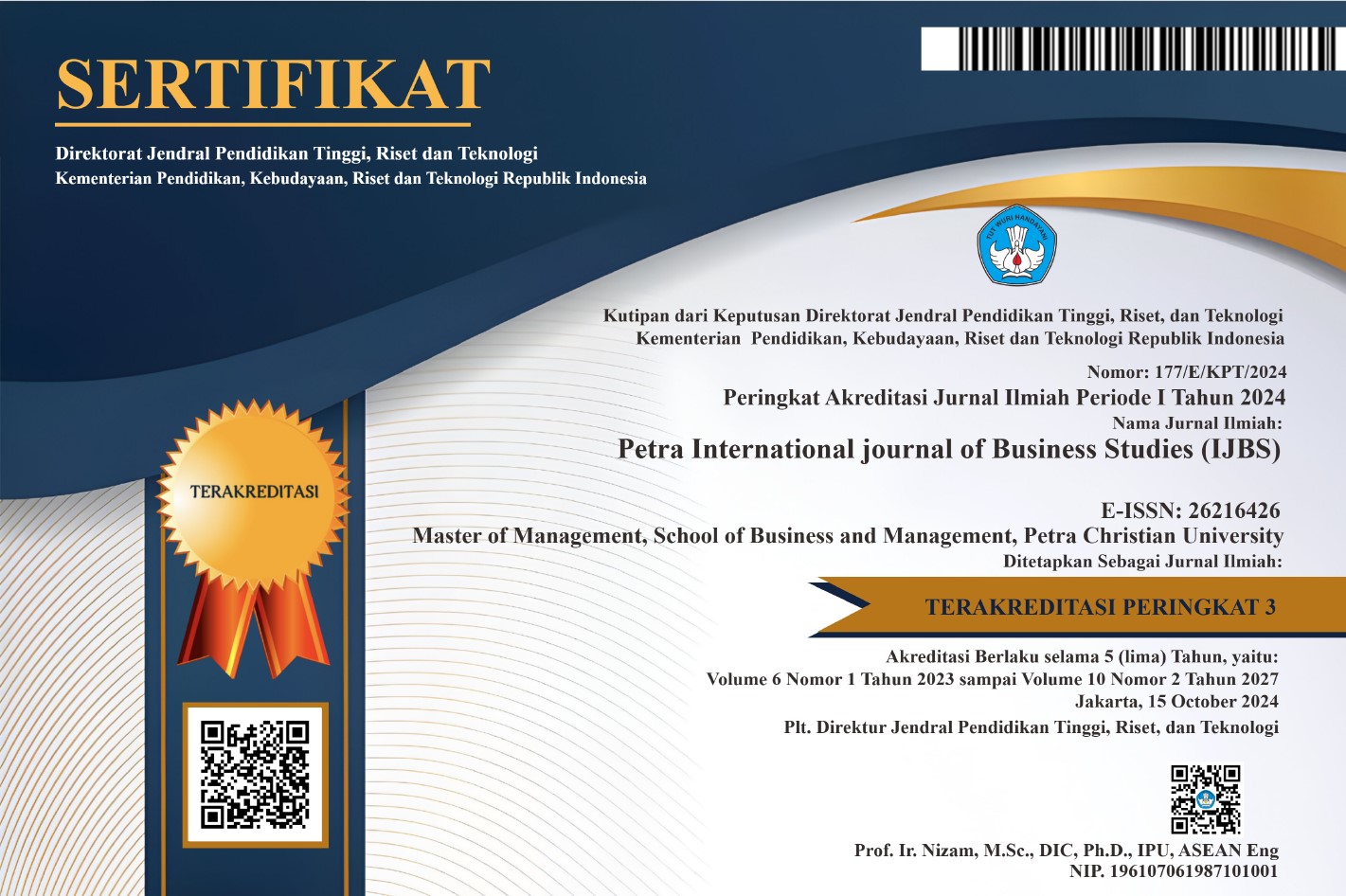The Influence of Idealized Influence, Inspirational Motivation, Intellectual Stimulation and Individualized Consideration on Teaching Behavior Mediated by Entrepreneurial Behavior
DOI:
https://doi.org/10.9744/petraijbs.7.2.201-210Keywords:
Transformational leadership, teaching behaviour, entrepreneurial behaviour, educationAbstract
The COVID-19 pandemic has highlighted numerous inequities within the education system, underscoring school leaders' need for strategic adjustments to enhance teacher competence for adaptive and effective teaching. This study investigates how transformational leadership influences teachers' instructional and entrepreneurial behaviors in the context of pandemic-era education. A quantitative research approach was employed, utilizing a 44-item questionnaire distributed to teachers to assess principal leadership, entrepreneurial behavior, and instructional practices. Findings indicate that principal leadership does not directly impact teachers' instructional behavior; instead, it influences their entrepreneurial behavior, which mediates the relationship between transformational leadership and instructional behavior. This research provides insights into the role of transformational leadership among school principals at the preschool and elementary levels within the framework of online education during the COVID-19 pandemic. Future studies are encouraged to incorporate a broader range of literature, as transformational leadership holds relevance across various institutional, organizational, and business contexts.
Downloads
References
Afsar, B., & Umrani, W. A. (2020). Transformational leadership and innovative work behavior: The role of motivation to learn, task complexity and inno-vation climate. European Journal of Innovation Management, 23(3), 402–428. https://doi.org/10.1108/EJIM-12-2018-0257
Anderson. (2017). Transformational Leadership in Ed-ucation: A Review of Existing Literature. Interna-tional Social Science Review, 93(1), 1–13.
Cavazotte. F, Moreno. V, B. J. (2013). Transformational Leaders and Work Performance: The Mediating Roles of Identification and Self-efficacy. Journal of Networks, 10(6), 490–512. https://doi.org/10.4304/jnw.8.6.1395-1402
Fayolle, A., Kyrö, P., Mets, T., & Venesaar, U. (2013). Personal values and entrepreneurial intention: an empirical study. In: Conceptual Richness and Methodological Diversity in Entrepreneurship Re-search.
Fiet, J. O. (2001). The theoretical side of teaching entre-preneurship. Journal of Business Venturing, 16(1), 1–24. https://doi.org/10.1016/S0883-9026(99)00041-5
Harmsen, R., Helms-Lorenz, M., Maulana, R., & van Veen, K. (2018). The relationship between begin-ning teachers’ stress causes stress responses, teach-ing behavior, and attrition. Teachers and Teach-ing: Theory and Practice, 24(6), 626–643. https://doi.org/10.1080/13540602.2018.1465404
Henry, C., & Lewis, K. (2018). A review of entrepre-neurship education research: Exploring the contri-bution of the Education + Training special issues. Education and Training, 60(3), 263–286. https://doi.org/10.1108/ET-12-2017-0189
Ho, C. S. M., Lu, J., & Bryant, D. A. (2020). The impact of teacher entrepreneurial behavior: a timely inves-tigation of an emerging phenomenon. Journal of Educational Administration, 58(6), 697–712. https://doi.org/10.1108/JEA-08-2019-0140
Joensuu-Salo, S., Peltonen, K., Hämäläinen, M., Oikkonen, E., & Raappana, A. (2021). Entrepre-neurial teachers do make a difference – Or do they? Industry and Higher Education, 35(4), 536–546. https://doi.org/10.1177/0950422220983236
Jovanovic, D., & Ciric, M. (2016). Benefits of Trans-formational Leadership in the Context of Educa-tion. 496–503. https://doi.org/10.15405/epsbs.2016.09.64
Loon, M., Lim, Y. M., Lee, T. H., & Tam, C. L. (2012). Transformational leadership and job-related learn-ing. Management Research Review, 34(1), 195–205.
Maulana, R., Helms-Lorenz, M., & Van de Grift, W. (2017). Validating a model of effective teaching behavior of pre-service teachers. Teachers and Teaching: Theory and Practice, 23(4), 471–493. https://doi.org/10.1080/13540602.2016.1211102
Northouse, P. G. (2019). Leadership (Theory and Prac-tice) (8th ed.). SAGE Publications.
Paletta, A., Alivernin, F., & Manganelli, S. (2017). Leadership for learning : the relationships between school context, International Journal of Educa-tional Management31, 31(2), 98–117.
Possel, P., & Rudasill, K. M. (2013). ThinkIR : The Uni-versity of Louisville’s Institutional Repository Teaching behavior and well-being in students : development and concurrent validity of an instru-ment to measure student-reported teaching behav-ior. 5(2), 5–30.
Rudhumbu, N., Parawira, W., Bhukuvhani, C., Nezan-doyi, J., Majoni, C., Chikosha, F., Zvokuomba, K., & Chingwanangwana, B. (2021). Insight into online teaching behavior of lecturers in Zimba-bwean universities during the COVID-19 era and beyond: issues and challenges. International Journal of Information and Learning Technology, 38(5), 518–539. https://doi.org/10.1108/IJILT-07-2021-0104
Saltelli, A., Ratto, M., Tarantola, S., & Campolongo, F. (2006). Sensitivity analysis practices: Strategies for model-based inference. Reliability Engineering and System Safety, 91(10–11), 1109–1125. https://doi.org/10.1016/j.ress.2005.11.014
Sharma, L., & Srivastava, M. (2020). Teachers’ motiva-tion to adopt technology in higher education. Journal of Applied Research in Higher Education, 12(4), 673–692. https://doi.org/10.1108/JARHE-07-2018-0156
Tromp, D. M., & Blomme, R. J. (2014). Leadership style and negative work-home interference in the hospitality industry. International Journal of Con-temporary Hospitality Management, 26(1), 85–106. https://doi.org/10.1108/IJCHM-04-2012-0058
van Dam, K., Schipper, M., & Runhaar, P. (2010). De-veloping a competency-based framework for teachers’ entrepreneurial behavior. Teaching and Teacher Education, 26(4), 965–971. https://doi.org/10.1016/j.tate.2009.10.038
Zuraik, A., & Kelly, L. (2019). The role of CEO trans-formational leadership and innovation climate in exploration and exploitation. European Journal of Innovation Management, 22(1), 84–104. https://doi.org/10.1108/EJIM-10-2017-0142
Zhao, X., Lynch, J. G., Jr., & Chen, Q. (2010). Recon-sidering Baron and Kenny: Myths and truths about mediation analysis. Journal of Consumer Research, 37(2), 197–206. https://doi.org/10.1086/651257
Additional Files
Published
Issue
Section
License
Copyright (c) 2024 Rini Puspitawati, Ricky

This work is licensed under a Creative Commons Attribution 4.0 International License.
Petra IJBS (e-ISSN: 2621-6426) is published by Master of Management program, School of Business and Management, Petra Christian University, Indonesia (MM SBM PCU).












